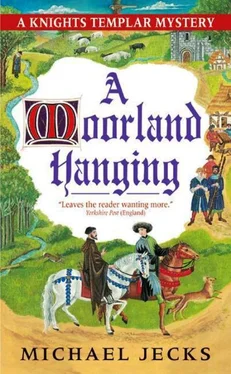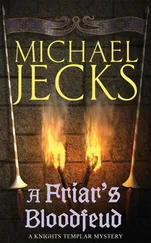It was not a request. Feeling ashamed, and not a little saddened at upsetting the lady of the Manor, Simon led the way from the room.
“This is how I used to feel when I was a small boy and my nurse sent me from the room for misbehaving,” Baldwin murmured to raise his spirits, and Simon smiled gratefully.
Once they had left, Matillida knelt at her husband’s feet, her hands in his lap. “You see how their minds are working? That whoreson Smyth has them on his side already. You have heard about the corruption of officials – well, obviously the bailiff thinks about his purse more than he does about justice! You must do something to make Puttock realize what a danger the miners are out there.”
Sir William looked old and tired, and for the first time she could see how the years had exacted their toll on his spirit. Resting one hand on hers, the other in her hair, he smiled weakly. “Poor Matillida! All you want is the family strong and secure, and all you find are threats on every side. What do you want me to do? Have Thomas Smyth murdered? Or maybe just have him tortured until he admits to killing young Bruther?”
“Don’t be foolish. No, we need to keep him with us, that’s certain. We cannot allow this affair to get out of proportion, to turn Smyth against us. You know that Robert is set on Alicia?”
“What! My son wants her? But he hates Thomas…”
“Of course he does, but that means nothing, not when it comes to the girl. And she would be good for him. She is intelligent and should bring a good dowry.”
He gave a harsh bark of a laugh. “A good dowry? Yes, very good! It will be our own money which is returned to us.”
“Yes, husband, but better that it should come back as a dowry than be lost to the family forever. And the girl would make him a good wife, as I say. Especially with me helping and training her. So we must ensure that her father is not at odds with us, mustn’t we?”
“But you said we need to make the bailiff realize how dangerous the miners are. How can we…”
“We must help the bailiff understand how unsettling it is to have outlaws and thieves masquerading as miners, of course. We do not object to freemen coming here and working, only the brigands and cut-throats. And if they are allowed to remain, is it surprising that people sometimes get killed by them? Of course not! That is the point you must make to the bailiff and his friend, that it is hard enough surviving here without having murderers and outlaws living nearby in a miners’ camp.”
He stood and sighed, looking down at her. “I will see what I can do.”
“You must! We have to try to keep Thomas Smyth happy so that he will smile on his daughter’s marriage to our son. It will make sense for him, to marry into a good family, and it will be good for us to have the use of his power and wealth. But he needs to be curbed a little. He must be made to realize that his power ends at the border of our lands, and he must not try to extort money from us again.” Nodding, Sir William made his way to the door, but before he could leave, her voice stopped him. “And if the bailiff listens to you, we might be able to break the power of other miners like him forever, and get control of the land for ourselves.”
Sir Ralph of Warton rode back slowly, his mind on the argument between Robert and John. He was fully aware how easily brothers could come close to blows. Not many years before, he had drawn sword against his own older brother, and that was over a bet on the price of a falcon. It was hardly a shock to see Robert and John so much at loggerheads – they were merely acting like brothers the world over – but he did find the degree of mutual animosity surprising in its virulence. There were undercurrents whenever either of them opened his mouth. Robert, slim, pale, weak-looking, and as a result obnoxious to the knight’s way of thinking, was still at least loyal and honorable, whereas John was openly flippant and insulting, with no regard for any man.
Today it had been Sir Ralph’s idea to go out hunting. He felt it would be good to get away from the claustrophobic atmosphere of the Manor, away from the gray eyes of the bailiff and the astute questions of his friend from Furnshill. Sir Ralph had anticipated a pleasant ride out to a quiet part of the Beauscyrs’ private park where they could set the hounds at a deer. It was some time since he had been able to enjoy hunting as a pastime rather than a necessary chore, and the prospect was attractive.
The reality had been very different. They had ridden eastward, away from the moors themselves, and out into some thick woods, and almost immediately the two brothers had started at each other. One – and he was not sure now who it was – had passed comment on the other’s choice of area for the hunt, and suddenly he was in the middle of a battle. It was a matter of pure self-defense to drop back as the insults and curses flowed, and all peace was gone. They had found a small buck and chased him for a mile or more, but then lost the scent, and of course each brother said it was the fault of the other. After biting back his rising anger for a further mile, Sir Ralph had lost any desire to be with the two and had announced his intention of returning. Hastily refusing any company, he turned his horse to the west and left, ignoring the pleading look from a man-at-arms who clearly wished to avoid any more bickering and also wanted to get back to the castle and a pint of ale.
There was some tension between the two young men that he did not understand. It seemed to go beyond the normal rivalry. Maybe it was simply the jealousy of the younger. In most families John would have been sent to a convent instead of into training as a knight. All too often, the second son was diverted to the religious life while the older carried on his education and training as heir. In this case, though, it should have been the other way around. Robert, for all his posturing and prideful behavior, was more suited to a cloistered life, while John was the resolute, strong and willful one. He would, the knight thought, have made a very good master of the Manor.
At the gate he called to the doorkeeper, dropping from his horse and walking into the courtyard. There he saw the other knight, the bailiff’s friend, and he stiffened. Squaring his shoulders he led his horse through to the stables.
“A good mount,” he heard Baldwin say, and nodded, avoiding the man’s gaze. He would have turned and made off, but the dark-haired knight was too close for him to pass, and so he stood dumbly, tugging off his gauntlets.
His indecision was painful to watch, Baldwin decided, and he smiled, trying to appear as friendly as possible. It only served to heighten the man’s anxiety. Baldwin patted the black horse’s rump, and then his eyes caught sight of the mark, visible on the left outer thigh although partly concealed by dirt – a large capital M. When he glanced back at the knight, he could see the sudden stillness in his face, the tautness in the way he held himself.
“Sir Ralph, don’t worry,” he said, so softly that the ostler could not hear. “Matters up at the Warbeck are not important down here.” And he turned and left. But he could feel the knight’s eyes on his back all the way across the yard.
Simon was at the entrance to the kitchen, Hugh and Edgar beside him. The bailiff and his man were drinking from large pots of ale, served by the old bottler.
“Drinking again, Simon? The beer will addle your brains.”
“Too late,” Simon said, and took another long draft.
“My brain feels addled enough already. Miners, knights, squires, villeins… pah! We’re wasting our time here! I have no idea who might have killed Bruther, I don’t even have any idea what the man was like. How can we find out who did it when all we have to go on is a series of vague dislikes about him?”
Читать дальше












